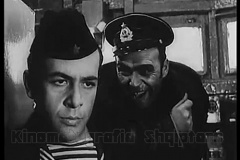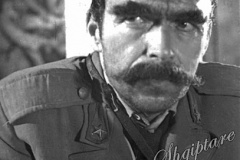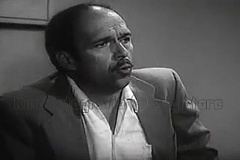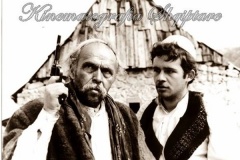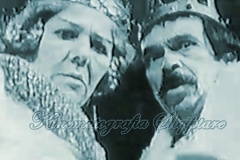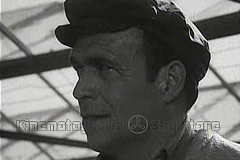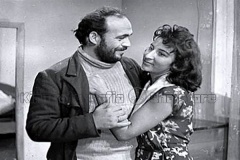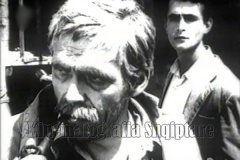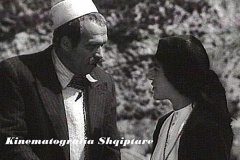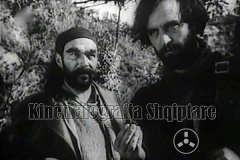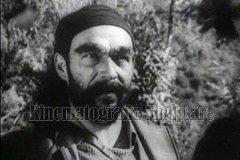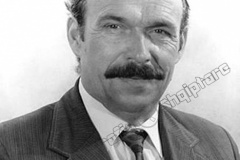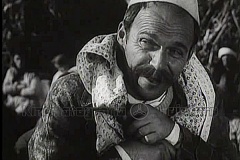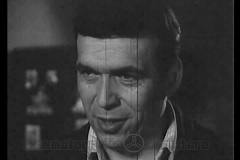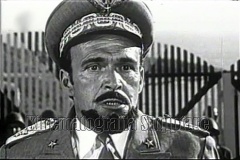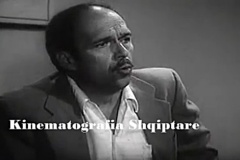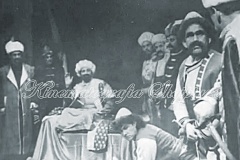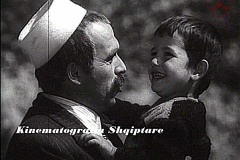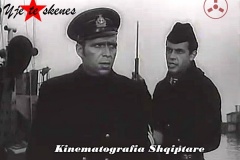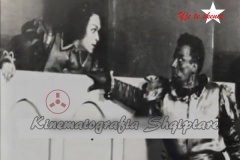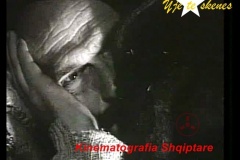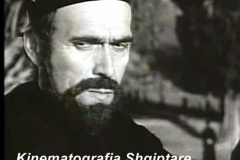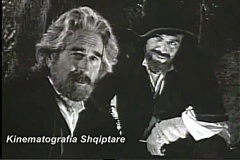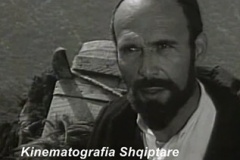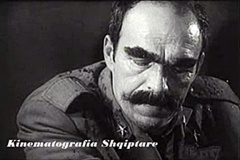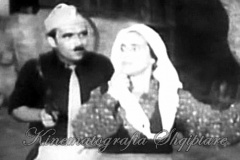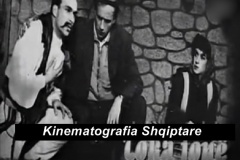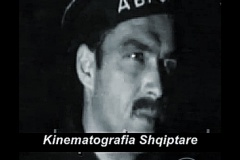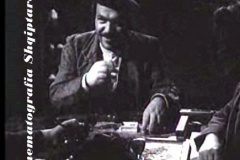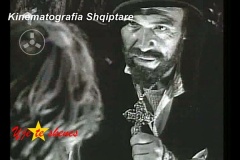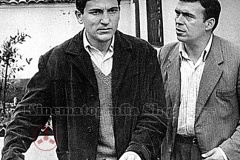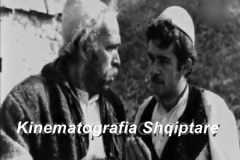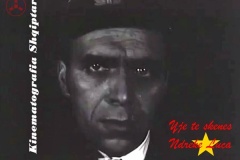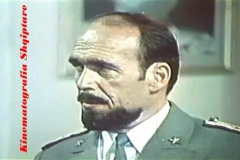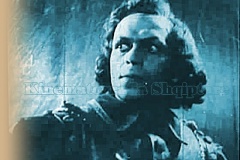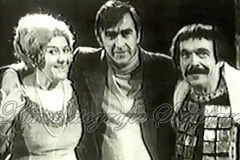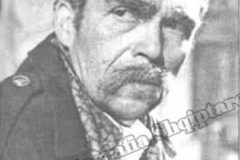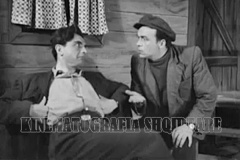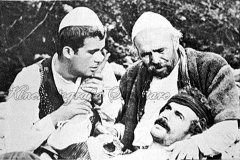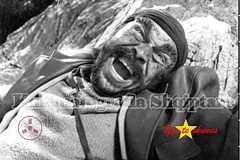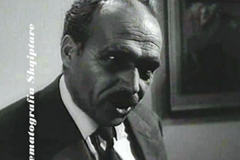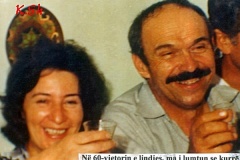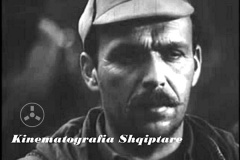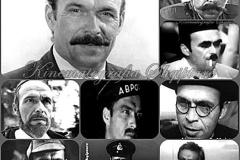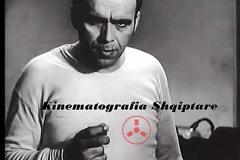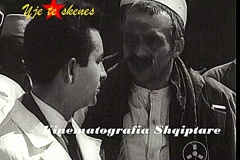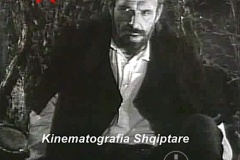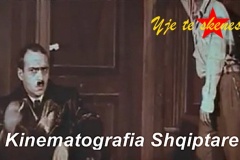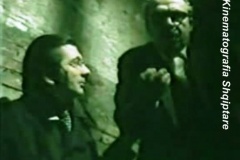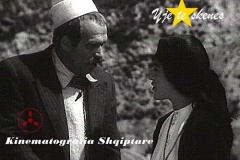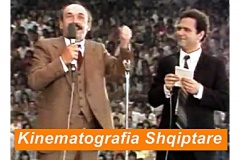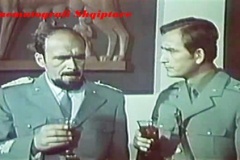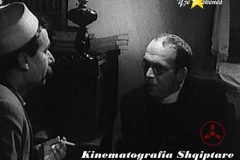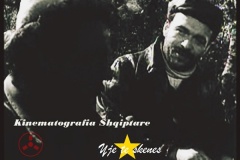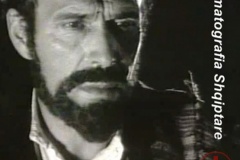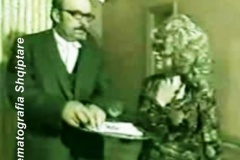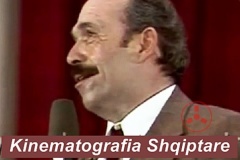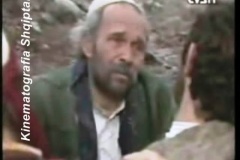Ndrek Luca (1927-1993)
You can write something, but not everything about our legendary actor “People’s Artist” Ndrek Luca. His artistic cult is so high that his word and charm penetrated the gates of the greatest works of the Albanian stage and screen. Even his portrait had something special, both mythical and cosmic. But what stood out more about Ndrekë Luca was the simplicity and human dimension of an artist with a rich and complex world.
Since the beginning of his artistic life, he has been quite motivated and optimistic, therefore the art bookmakers concluded with great optimism that this man would bring something new to the magical pantheon of performing arts.
As a young man, before the liberation, a competition was held by the Italians, and after a while, Ndreka received a letter saying: “You have received the first prize for cinematography”. It was a prize as a photographer, where he would have been given the right to study in Italy, but the war took its toll” (according to “Gazeta Balkan”, August 10, 2004).
When he saw the performance of Jago at the National Theater, the Russian Azhar Aric said: “You have to do with a world actor” (acording to “Gazeta Balkan”).
When the Pharisees asked Christ if it was legal to pay taxes to Caesar, Christ answered: “Render therefore to Caesar what is Caesar’s and to God what belongs to God”.
We must give what belongs to the great artist Ndrek Luca, that he belongs to the world and the artistic soul.
Ndrek Luca was born on September 3, 1927, in Xhan of Dukagjini, in a typical village suite surrounded by steep and shady ridges next to the depressed valley of Kiri, where the old Dukagjin proudly and unabashedly preserved their typical arboreal identity. Luca si one of the most interesting species of its kind, it was a product of alpine nature, the duke’s upbringing would leave its mark on all the roles he played.
Authentic and unrepeatable, both on stage and on screen, a sporty body fit for an aviator, with prominent masculine impulses in whose temperament a mixture of choleric and phlegmatic was grafted. A gracefully carved prototype of the mountaineer, serious and static at first glance, which radiated warmth, wit, intelligence of a superior degree, exemplary nobility on whose face rested the elusive sleepy smile of the people of his homeland. In this man with the republican hat, the sterile black mustaches, the lively, expressive eyes, the wrinkled eyebrows, the lines of wrinkles, his facial expressions so plastic and in relief, his general expressiveness, as well as his creative ability for each role, are fixed in celluloid through the names of movie characters, one more interesting than the other, making him one of the most favorite actors of the Albanian screen.
Everyone had the pleasure of being in his company as a brilliant insightful lively conversationalist. When he talked about Dukagjin and Kosovo, his eyes sparkled, but he also became more discreet. When he talked about Shkodra, traditions and humor, he became enthusiastic, cheerful and lively, laughing with all his heart, with a deep, infectious, sincere and loud laugh. (according to: Dr L-Martini, “Dukagjini” newspaper, January 2005).
He was at a young age when the family moved to Shkodër due to economic poverty. His mother, eager for the light of knowledge, took Ndreka to the Jesuit school, but at the same time she also worked as an assistant at the Marubi photo library. The school helped the poor “vocerrak” (child) to bond more strongly with the book, which he has had as his closest friend throughout his life.
“I come from Dukagjini. I grew up door to door, working since I was a child for the “indestructible animal” as Migjeni used to say. We lived in a house in Shkodër, in a shed where clothes were washed, where rain and cold entered, where we were illuminated by the pine light coming from the mountain, sometimes with bread, sometimes without bread, but we didn’t miss the song and the bath. So I grew up in the city, but never once separated from the environment of the mountain, not even to this day “(Unknown conversations of our great artists”, “Standard” newspaper, 30.03.2006).
At the age of 14, when he started to deal with art, it is understood with amateur groups, he initially played the role of an old man. symphonic concerts, recited Hamlet, King Lear”. (L. Kodra “Prominent people of Dukagjin”).
Apparently, Ndreka himself had felt that he was born to be an actor, not an aviator, that’s why in 1947, when the relations between Albania and Yugoslavia broke down, Ndreka, without hesitation, returned urgently, even though he was in the last year of his military studies. When he returned there was a silent duel between the officer’s career and what he dreamed of becoming, a great odyssey of ebbs and flows, misunderstandings, confusions, until one day he rebelled against the uniform, ranks and privileges of the military and knocked without fear the eye in the door of the theater.
Calling him a “deserter”, the higher command refused to issue him a transfer slip. Remembering this episode, Ndrekë Luca said in his memoirs:
It was the year 1950, when the answers came to me one after the other: One no, two, no, three no….One day I went to the director of the personnel:
Are you back? – he asked me. Did you get the answer?
– I got it, but I don’t agree, – I answered. I go or die! I told him. You can delay me but never stop me”!
After the stubborn fight, Ndrekë Luca would leave the army, joining the ranks of the Army Theater, where he played only two roles, since in 1951 this theater was merged with the “Teatri Popullor” , whose part will be Ndrekë Luca, who started in a spectacular way, on the track where the founding stars of this temple were, Mihal Popi, Loro Kovaçi, Naim Frashri, Pjetër Gjoka, Marie Logoreci, Besim Levonja, Sulejman Pitarka, Kadri Roshi , Lazer Filipi, Melpomeni Çobani etc.
He had the great fortune, that as soon as he started working, like the other actors, they were educated and trained by the director of the great Russian Krichko, where Stanislavski was thoroughly studied. Later, Ndrekë Luca played several characters such as Kurtov in the drama “The Lovers’ Plot”, messenger in “Revizori”, Ludvik Gustakovčit, in “Six Lovers” etc. (According to: Kinostudio Archive N.Luca File).
 The artist Luca had high demands on himself, for the realization of the figure of the roles he played, he had to tire a lot, sleepless nights create new things for the dimensional reformation of the character, (down to the little things such as the definition of props, or make-up).
The artist Luca had high demands on himself, for the realization of the figure of the roles he played, he had to tire a lot, sleepless nights create new things for the dimensional reformation of the character, (down to the little things such as the definition of props, or make-up).
He had to clash with his colleagues, meet with the directors and screenwriters, as well as enrich himself with wonderful impressions and pleasant memories for everyone.
Ndrekë Luca, like no one else in Albanian cinematography, were the artist who embodied the worst features of a whole gallery of characters of bad people, the good man of the “bad” role that art gave us, while in life he was the living antithesis of to what happened on celluloid.
His dignity extended beyond the “People’s Artist” facade because at that time he was everyone’s artist. Like few living actors, people greeted him even when they did not know him by the name of the roles he had played.
 Even when he crossed the street, he was followed by the angry looks of the children who identified him with the “Bad Man”.
Even when he crossed the street, he was followed by the angry looks of the children who identified him with the “Bad Man”.
Ndrekë Luca has been baptized on the stage with such names as Dini in “The Fisherman’s Family”, Greov in “Enemies”, Deli Pjetra in “Seven Shaljans”, Gost in “Hamlet”, Rejshek in “Djali plage-prishes”, “Baca” in “Baca of Gjetaj”, Giri in the drama “Arturo Ui”, Brung Troli in “The Great Flood”, Abdullah Pashë Dreni in the drama “Besa e Madhe”, Shpend Gjeto Plakun in “Halili and Hajria”, Jonuzi in the drama “The Fisherman’s Family”, etc. (Archive of the National Theater, File N.Luca)
It is a long and difficult statistic to count the roles that Ndreka played in the theater and cinema, even when he was alive, he never tired of thinking about what he played, but what would play in the future. “Playing comes the appetite to increase. Will I be able to continue, can I afford it, I don’t know. But today it seems to me that I am at the beginning. You have to feel yourself in every role, as if you are at the beginning of work, because the role comes with its own characteristics. I entered with greatness so that the director and the spectator know who I am, you drowned, you have no life (from the tape recorder of Luca’s personal archive, recorded in April 1986).
A great free-spirited and white-hearted artist, simple in communication, unyielding, a keen observer and an attentive listener of the thoughts of even younger partners, so he was one of those good, sober and clear people who know how to follow always an honest way, who always reason rightly and tend in their thoughts to appreciate the merits of everyone.
“I dreamed about the role of Othello, even to this day I am haunted by the desire to play him. But the director, even though he knew what I was dreaming about, trusted me with Iagon”. (Xh. Aliu, “Standard” newspaper, March 13, 2006).
 Jago was an omen for Ndreka Luca, who was lucky enough to meet Shekspeare and prove his potential as a skillful hunter of roles and role-players of great works.
Jago was an omen for Ndreka Luca, who was lucky enough to meet Shekspeare and prove his potential as a skillful hunter of roles and role-players of great works.
Ndrekë Luca, with his play, gave the Albanian public of the 50s in the most transparent way a vile Jago, a black soul, cruel and evil like no other, but wise and cunning like a fox. Immediately after Jago comes Guduni, the hero of Aurora, and then there is the meeting with Leka in the drama “Our Land”. The director Pandi Stillu would trust the character Leka to Ndrek Luca because as our famous artist said:
“Leka, he was the man of my blood, of the environment that raised me. He was part of this land exploited to the maximum by the Turks and represented the most positive of the poor village, of the time on fire”.
In addition to acting, Ndrekë Luca also contributed as a playwright by writing the dramas “Seven Shaljans”, “Foreign Votra”, but also one-act pieces, such as “Bardha”, which has also won awards abroad.
The comedies “Dream in the Sun” and the drama “Jerina” are still unpublished, and there are other unknown comedies in his drawer.
The subject of the drama “Shtate Shaljanët” rests on a long-standing historical motif of the anti-Ottoman stand of the martyrs of the author’s homeland, a region which preserved the memory of Gjergji e Leka indelibly, where for hundreds of years the faith of the man and freedom were the cult the most powerful of men, huddled somewhere between the mountains in an overgrown piece of Illyria.
Ndrekë Luca, in this drama staged in 1958, would interpret in the finest way, the role of Deli Pjetri, the brave, patriotic man, this real historical character who, for his faith and word, challenges all the champions of legends ours. This drama, then, due to the ideological vagaries of the time, would be stuck in the rusty vault of the archive.
 Ndrekë Luca, spectacularly plays the gangster Giri in “Arturo Ui”, gives the audience an adventurous character, full of artistic sparks that deserved many applauses and congratulations.
Ndrekë Luca, spectacularly plays the gangster Giri in “Arturo Ui”, gives the audience an adventurous character, full of artistic sparks that deserved many applauses and congratulations.
In “Silent Duel” movie, regardless of the political colors of the time, Rami is skillfully portrayed, giving us the classic image of the two-faced evil captain, without ideals, a clever fool, servile, prepotent and ruthless in the realization of his personal ambitions.
Ndrio in “The road of letters” is so realized that the artist himself must have felt “disgust” towards himself, bringing us in the most natural way the two most disgusting features of the anti-Albanian clergy of the Greek Patriarchate, the fox and the lowest savagery of man, disloyalty when found unarmed, heresy towards our mother tongue, perfect calmness in the execution of the macabre crime, and the transfiguration and malice where the job is to save one’s own skin in dealing with Brass.
A typical Anatolian pasha, so cruel and tiran, so wicked and blind to accidental light, so cunning and treacherous, so cowardly and immersed in the endless harems and filth, even sly and comical in the years when old age overtakes him, appears in “The Ballad of Kurbin”.
In the memory of Albanian art lovers, even not only in the vocabulary of the adult generation but also of teenagers, the proverbial jokes circulate time after time: “Këtu ka tradhti burra”, “Kjo ishte loja”, “Fashista trima”, “Kush e vrau Kaparal Pelegrinin”, “Mos Tunxh se do të ngopesh me flori” etc.

Ndrekë Luca would also shine in the performance of dozens of positive roles, such as Januz Bunga in the movie “Oshtime ne bregdet”, Palush Dibra in “Halili e Hajria “, Tomorri in “Special Task”, Abdulla Dreni in “Besa e madhe”, while Gjini in “Old Wounds”.
According to the opinion, it represents the highest shackle of the typology and psychological character of the northern mountaineer brought out in the sunlight in an unrepeatable way by the mountaineer artist Ndrekë Luca.
Specialists and critics are more or less of the same mind, that with “Baca i Gjetajve” Ndreka reached the highest interpretive heights in the genre of Albanian dramatic theater. The type of the time wrote “Baca i Gjetajve” in the interpretation of N. Luca, magnificent with its simplicity, it is a very lively, vital face in all its similarities, the human softness that equips a person, as a person and as a parent… qualities of a simple person of the people, who are equipped with their natural virtues”.
The drama was an extraordinary success, both in Albania and in Kosovo. In the memory of the playwright Fadil Kraja, the tour of the Migjeni theater troupe in Kosovo remains unforgettable: Luca was never free in the “qeleshen e bardhe” of Albanians, but in the constant company of his Kosovar brothers with whom he talked, admired, spoke passionately about songs, theater, cinematography, the painful history of all wounds and every night, interpreted twice ,
 The newspaper “Rilindja e Prishtines” on July 2, 1980 highlighted in black: “It is worth highlighting the brilliant interpretation of Ndreke Luca, who performed Baca i Gjetajve at a perfect artistic level.”
The newspaper “Rilindja e Prishtines” on July 2, 1980 highlighted in black: “It is worth highlighting the brilliant interpretation of Ndreke Luca, who performed Baca i Gjetajve at a perfect artistic level.”
And “Flaka e Prishtines” on July 15, 1980 wrote: “Ndrekë Luca embodied the “Baca e Gjetajve” and contributed enough to make this heroic, dramatic figure what it was.”
Kosovar researcher and publicist Ali Kaba expressed his opinion. “With Baca, I see the face of a simple mountaineer, who is able to sacrifice everything for freedom and homeland… N.Luca with his talent illuminates Baca’s face.
In 1982, Luca worked at the Migjeni theater in Shkodra, for the tragedy Shakespeare’s “Macbeth” and because he had serious health problems, he did not stop working but continued with perseverance and dedication until the successful release of the premiere.
 “I was in intensive care. I was in resuscitation. I had the script of Macbeth with me. When I had my second heart attack, the doctors came and took it away from me alarming. You can’t do it anymore, they told me. Emotions hurt you. You should even retire from the stage.”. No, I will not! I’m going to play the role, I told them. You can play with your health, but we have the duty to give the necessary advice. But I work, I write, I also dream about the roles. Macbeth was staged by Serafin Fanko, and that is the essence.
“I was in intensive care. I was in resuscitation. I had the script of Macbeth with me. When I had my second heart attack, the doctors came and took it away from me alarming. You can’t do it anymore, they told me. Emotions hurt you. You should even retire from the stage.”. No, I will not! I’m going to play the role, I told them. You can play with your health, but we have the duty to give the necessary advice. But I work, I write, I also dream about the roles. Macbeth was staged by Serafin Fanko, and that is the essence.
It takes place in the theater of Shkodra family member of the Luca family, recorded in April 1986.)
The man who “saw” death with his eyes in dozens of roles, since January 16, 1993, is no longer alive.
He passed away when he had ambitious plans at a time . Holding Duakgjin’s “qeleshe te bardhe” on his head, he was buried according to his bequest. Now he has just passed the 80th anniversary of his birth, and Luca is remembered well-known by the endless gallery of his characters, he remains one of the most loved people of the Albanian screen. This love was so great that wherever he was, he went, he was surrounded by a bunch of benefactors and, above all, many grateful people. Ndrekë Luca as an actor with an iron will who debuted in the theater since childhood, while on the screen he completely found himself and revealed such values that remained unforgettable in the souls of art lovers who will always remember him with a deep sigh of gratitude.
____________________
Albanian Cinematography in 2013
Note: The information in the construction of this article was made possible by various articles and newspapers / July 2013.
Follow us: Blog: https://albaniancinematography.blogspot.com/ Vimeo: Albanian Cinematography (vimeo.com) Facebook: https://www.facebook.com/ksh.faqjazyrtare Dailymotion: https://www.dailymotion.com/kinetografiashqiptareartisporti YouTube: https://www.youtube.com/channel/UCDRYQ5xCyGkfELm3mX8Rhtw
Discover more from Albanian Cinematography - Sport
Subscribe to get the latest posts sent to your email.

